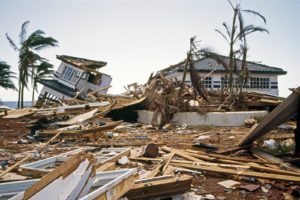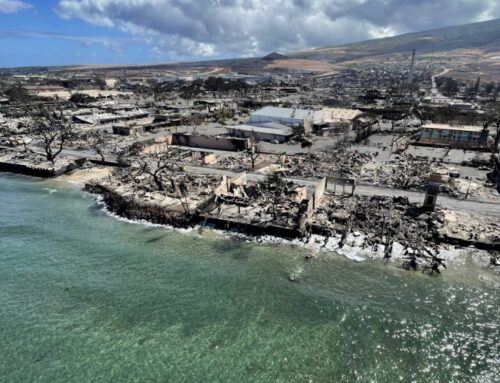Some hurricanes, or tropical cyclones, pass by the Hawaiian islands with little or no damage. But then there are storms, not even labeled as a tropical storm or hurricane, that take a turn for the worse, leaving roads a mess, utility lines down and causing damage to homes and businesses.
 The island-wide storm that hit Maui February 9-11th, 2019 is a good example. Emergency weather alerts were for a winter storm or wind events. With winds up to 160 mph on Maui’s highest peaks, many residents and visitors in lower lying areas were caught unprepared. Sections of the island lost power for up to three days, and downed trees and power lines made driving hazardous. In addition, communication systems, ie, internet, cellular and phone systems, were also knocked out, especially upcountry and on the North and East shores. Several inches of snow fell on Haleakala, but also in Polipoli State Park at the 6,500 ft elevation- a first for the park record books.
The island-wide storm that hit Maui February 9-11th, 2019 is a good example. Emergency weather alerts were for a winter storm or wind events. With winds up to 160 mph on Maui’s highest peaks, many residents and visitors in lower lying areas were caught unprepared. Sections of the island lost power for up to three days, and downed trees and power lines made driving hazardous. In addition, communication systems, ie, internet, cellular and phone systems, were also knocked out, especially upcountry and on the North and East shores. Several inches of snow fell on Haleakala, but also in Polipoli State Park at the 6,500 ft elevation- a first for the park record books.
Imagine if the only way out of your home or condo is on foot, and there is no phone or internet service to call for help. Condominiums should have an emergency plan in place- check to make sure yours is updated. Homeowners should also have a plan in place. Both types of residences can benefit from the tips below.
BEFORE THE STORM
 Well before the next storm hits, make sure to prepare your property. Follow these tips compiled by the Hawaii Department of Commerce and Consumer Affairs.
Well before the next storm hits, make sure to prepare your property. Follow these tips compiled by the Hawaii Department of Commerce and Consumer Affairs.
- Make plans to secure your property (install hurricane clips and storm shutters, cut overlying branches, clear rain gutters, turn off water, gas and electricity, and lock all entry points). Use this Hurricane Safety Checklist (PDF, 77 KB) to keep track.
- Review your insurance coverage. Make a copy of your insurance policy in case you need to file a claim. Hurricane Preparedness Tips. And get answers to your insurance questions in this FAQ.
- Make copies of your important papers (identification cards, insurance policies, prescription medication). Protect Your Critical Documents and Valuables (PDF, 828 KB)
- Create your emergency financial first aid kit. (PDF, 2.58 MB) Make an inventory of your personal property (home, car, jewelry, computer, appliances, furniture). Photos and videos are a good way of documenting your property.
- Make sure you have a 14-day supply of rations (bottled water, non-perishable food items, medication). If you aren’t able to buy bottled water, here’s how to prepare drinking water for an emergency. Recommendations For Disaster Preparedness Kit
- Make an emergency kit (battery powered radio, first aid kit, blankets, clothing, personal hygiene supplies, a small amount of cash). Red Cross Kit Checklist
- Make a plan for your pet (not all shelters welcome pets). Have enough food and medication for your pet and don’t forget their ID tags, collar and leash. Disaster Readiness
AFTER THE STORM
- Continue to listen for the latest updates, wait for authorities to cancel any warnings, be aware of debris and other dangers on the road, and have your home or business inspected if there is the possibility of structural damage.
- When repairing your home or business, make sure you hire a licensed contractor. Call the DCCA Consumer Resource Center to check whether the contractor has a valid license and if they have any prior complaints. Get more information on hiring a licensed contractor after disaster strikes. (PDF, 120KB)
- When purchasing vital consumer goods like food and water, be aware that price increases are prohibited during a state disaster. Some exceptions apply. See Price Increase Prohibition (FAQs) below for more information.
- If you live in an affected area, rent increases are prohibited unless the rent increases are in writing, signed by the tenant prior to the disaster declaration. Some disaster related expenses may be passed on. The Price Increase Prohibition (FAQs) will help to answer some questions.
- Check with your local water utility office for water quality and whether water treatment (PDF, 69KB) is necessary. State law prohibits sellers from making misleading claims about water treatment devices or about the safety of the water supply.
- Disaster victims may see an increase in door-to-door sales (PDF, 69KB). Any contract you sign may be legally binding. If there is anything you don’t understand in the contract, don’t sign it! Under Hawaii’s “cooling off” law, you have three business days to cancel in-home purchases of $25 or more.
- When shopping for a loan to make your repairs, be aware of guarantees, 1-900 numbers and a request for money upfront. Be wary of advance-fee loan scams. (PDF, 69KB) Legitimate lenders may charge a processing fee, but don’t guarantee in advance that you will qualify for a loan.
- If you are having difficulty paying your bills after a disaster, be sure to contact your creditors and explain your situation. They can discuss the situation and work with you on creating a plan.
- Protect yourself after a disaster. Beware of those taking advantage of disaster victims. Shop around for the best deal. If it sounds too good to be true it probably is. Call the DCCA Consumer Resource Center for more information about scams in your area. Get more information on disaster-related scams. (PDF, 69KB)
- Beware of donation scams after a disaster. Many charitable organizations pop up after a disaster to ask for donations to assist those that have been affected. Make sure you know who you’re donating to. Some tips on making donations to charitable organizations.
- If your property or business suffers damage,
please report it through the County of Maui website.
- Reporting may help our local area obtain disaster relief funds.







